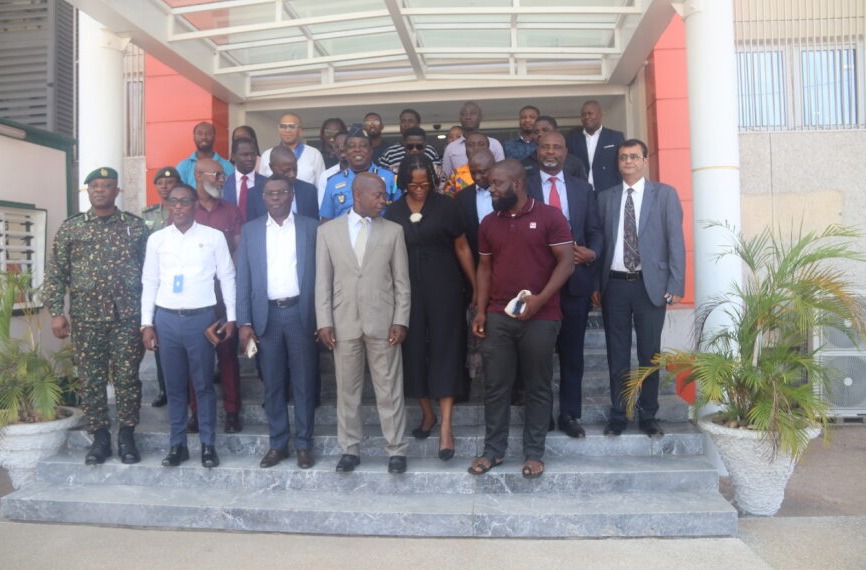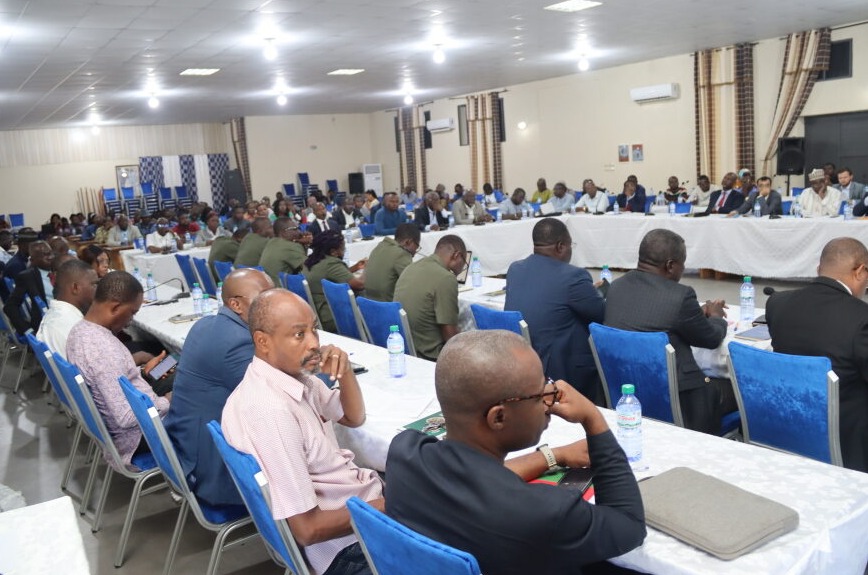From George-Ramsey Benamba
Lome, Togo, Sept 1, GNA – The African Continental Free Trade Area (AfCFTA) is one of the flagship projects of Agenda 2063:
It is a high ambition trade agreement, with a comprehensive scope that includes critical areas of Africa’s economy, such as digital trade and investment protection, amongst other areas.
By eliminating barriers to trade in Africa, the objective of the AfCFTA is to significantly boost intra-Africa trade, particularly trade in value-added production and trade across all sectors of Africa’s economy.
Since its launch and establishment of its secretariat in Accra, Ghana there have been promotional activities from both public and private organisations to ensure a cheaper and effective trade among African countries.
Apart from conferences and other sensitization programmes, participating countries have also developed country-specific policies to enhance its effective implementation in the continent.
GITFiC’s Promotional role
Ghana International Trade and Finance Conference (GITFiC) is one of the leading private sector organisations spearheading the sensitization and collaboration to achieve the goals of AfCFTA in the shortest possible time.
GITFiC is an outfit working with the private sector and the Government sector in the sub region and the continent at large to drive the African Continental Free Trade Agreement (AfCFTA) and broader development agenda of the continent as defined in the A.U. (Agenda 2063) and global trade issues at large.
It believes that the three thematic basic areas of services Trade, Trade Finance, and Logistics are the fundamentals in articulating ways of enhancing intra Africa trade, regional integration, trade liberalization, trade policies, and practices of the African continent.
They therefore focus on staying current with the business environment in Ghana and beyond using knowledge not only from domestic resources but also from the African Continent as well.
This connection of knowledge from the local and continental business environments i.e. business executives, policy makers, and subject matter experts seems to be the right direction to exhilarate the business communities in Africa and also serve as a major driving force moving Africa as a bloc in the global trade.
We believe that policies based on regional and economic integration are the pillars of success.
GITFIC and neighboring countries
Apart from organizing annual conferences, where issues pertaining to AfCFTA are thoroughly discussed, GITFiC has also written a book, which is establishing itself as the major guidelines for AfCFTA.
The Chief Executive Officer and other leadership members, have also visited countries like, the Ivory Coast, Namibia and Togo among others to sell out ideas of AfCFTA to governments, non-state actors and the African business community.
The Ghana International Trade and Finance Conference (GITFiC) is indigenously Ghanaian and legally carries its mandate under the laws and regulations of Ghana.
It has acquired an extensive recognition in its agenda of promoting the role financial and trade institutions play through their Modus Operandi, which is imperative for the smooth run of the AfCFTA and other Trade Agreements.
GITFiC, since its inception in 2016 has supported the agenda for the creation of a Single Continental Payment platform, where all financial transactions will be carried out on the AfCFTA platform.
GITFiC’s mission to Togo
Like its previous activities in other African countries, Ghana International Trade and Finance Conference GITFiC, successfully held a day’s conference in Lome, capital of Togo in partnership with the Togolese Ministry of Commerce, Industry and Consumption on August 22nd.
A Ghanaian delegation totaling 30 met over 250 key stakeholders from Togo to conference on the AfCFTA and the PAPSS dubbed; Enhancing Trade Relations between Ghana and Togo; Issues and Challenges related to Trade and the AfCFTA Market.
Customs and Immigrations top officials (sector commanders) from both countries constituted the technical panel with keynote addresses from Ghana’s Ambassador to Togo, Togo’s deputy Commerce, Industry and Consumption Minister, CEO of Ghana Highway and the CEO of GITFiC.
CEO OF Ghana Highways Authority
Mr Christian Nti, Director General of the Ghana Highway Authority during the conference in Lome, Togo stated that the success of the African Continental Free Trade Area (AfCFTA) would partly depend on the quality of roads in participating countries.
“If we have to improve trade volumes among African countries, especially using road transport, then we need to have quality roads that will transport goods to the participating countries.”
The forum which attracted industry players from Ghana and Togo was organised by GITFiC to buttress the activities of AfCFTA secretariat in their bid to create a common market among participating counties in the continent and beyond.
The elimination of NTBs is critical to boosting intra-Africa trade and achieving the objectives of the AfCFTA.

It will reduce the costs of trading across borders and ease cross-border movement of goods and the bulk of the AfCFTA benefits will be realised if State Parties efficiently manage and eliminate NTBs.
According to the World Bank, The AfCFTA agreement aims to provide broader and deeper economic integration across the continent as well as attract investment, boost trade, provide better jobs, reduce poverty and increase shared prosperity in Africa.
Mr Nti called for the investment of 80 per cent of Africa’s resources on road building to facilitate the movement of goods and services and make trade cheaper than importing from other continents.
He said with good roads, farmers would not incur post-harvest losses, a situation that could also encourage more Ghanaians into agriculture to produce more raw materials for export and domestic consumption.
The CEO added that investing on roads could take a lot of people selling and hawking on major streets to engage in other ventures for their livelihoods.
Ghana’s Ambassador to Togo
During a visit to Ghana’s Ambassador and during the conference, Mr Kofi Mensah Demitia, he urged Ghanaians to take advantage of the location of the AfCFTA secretariat in Ghana to create opportunities that would inure to the benefits of all Ghanaians.
He said trade volumes between Ghana and Togo could rise significantly if barriers were removed for the free flow of goods and services.
“These two sister countries can only grow their trade volumes, if they relax some of the taxes and place themselves for win-win situations, rather than trying to sabotage one another, which will not benefit any member of the countries.”
The CEO of GITFiC
Mr Selasi Koffi Ackom, Chief Executive Officer of the GITFiC said the primary aim of his outfit was to promote healthy trade among African Countries.
To ensure its feasibility, Mr Ackom said GITFiC had for the past years moved from one African country to the other to sensitise the business community on the benefits of AfCFTA.
He said GITFiC had also written a book to buttress their promotion exercise to enable business partnership and free flow of goods and services in the continent and advised the Business community to use the book as a guideline to achieve the goals of AfCFTA and beyond.
Togo’s message
Mr Koffi Vinyo Mensah, Director of Cabinet for the Togolese Ministry of Commerce, Industry and Consumption called for a deliberate cooperation among participating countries, to ensure free,, cheaper and faster trading activities among stakeholders.
He called for the full implementation of non-tariff market, e-market and other conditions that would facilitate trade among countries.
He expressed the readiness of Togo to cooperate with Ghana and other countries to ensure the success of AfCFTA in the coming days.

Panel discussions
Although the panel discussions made up the security agencies from both Ghana and Togo dwelt on fostering trade and commerce in the respective countries, discussions also spelt out some challenges on transition, petty financial demands and petty impediments on the way of commuters that need to be cleared for smooth transactions.
Recommendations
Although there are teething challenges on the full implementation of the rules and regulations of AfCFTA, participants recommended the increment of sensitization tempo to allow participating countries to relax their stance on some measures meant for their various countries.
They also recommended that there should be major impediments on the transportation of goods and services among countries especially at the West African coastal belt.
GNA